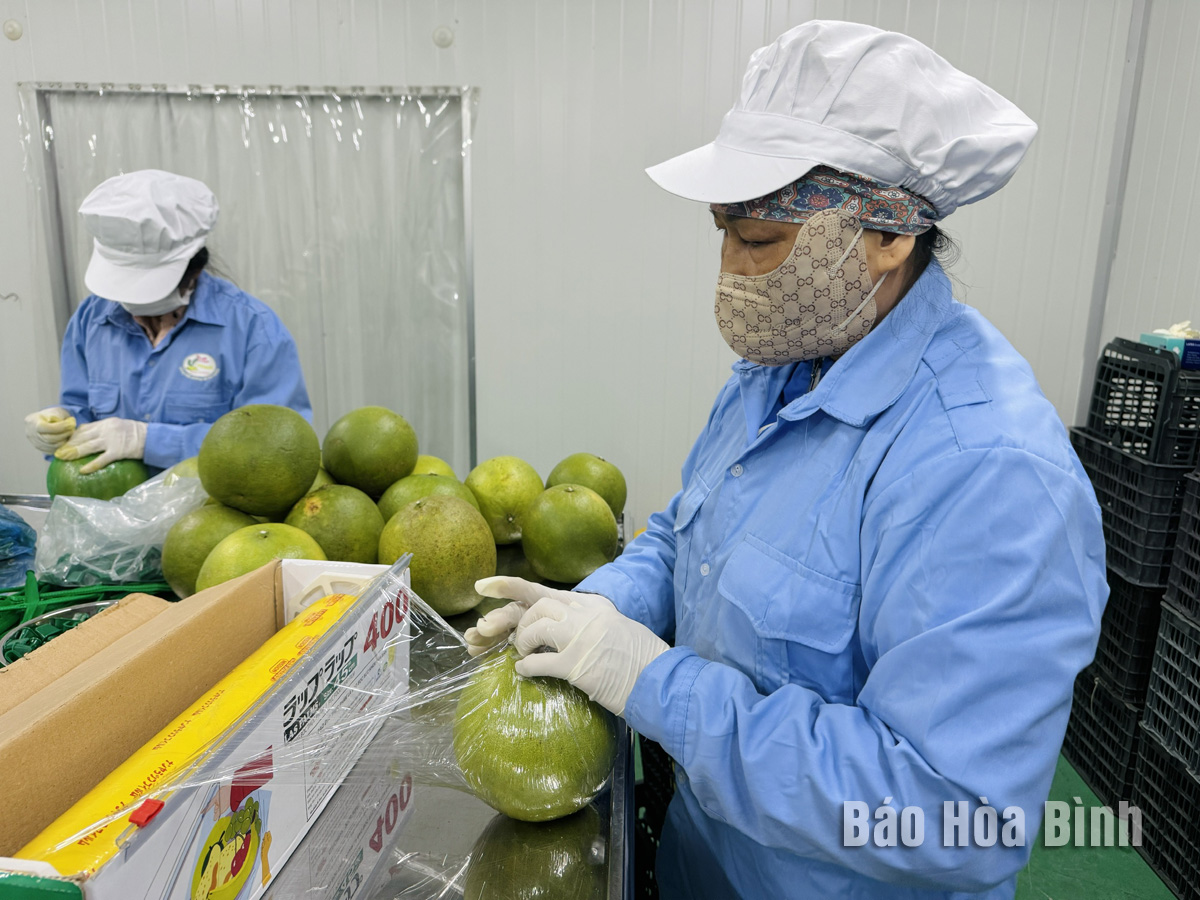
Since the beginning of this year, under the direction of the Department of Agriculture and Environment, the Sub-Department of Agricultural, Forestry, and Fishery Product Quality Management has strengthened the integration of the professional activities to promote and guide the organizations and individuals in the production and trading of agricultural, forestry, and fishery products to comply with the legal regulations regarding the use of chemicals, pesticides and veterinary medicines in crop cultivation, livestock farming and aquaculture. They also provide guidance to processing and manufacturing establishments on keeping the records to trace the product origins and using food additives from the approved list according to the regulations.

The green-skinned pomelos from Tan Lac district have been
packaged and labeled before being exported to the EU market.
Along with
this, the process of guiding the evaluation of the establishments for
certification of compliance with the safety conditions has been intensified.
Since the beginning of 2025, the Sub-Department has guided, evaluated, and
issued the food safety certification to 5 establishments involved in the
production and trading of agricultural, forestry, and fishery products; evaluated
and issued 2 certificates for the establishments selling pesticides, and 2
certificates for the establishments selling fertilizers in the province’s
agricultural supply businesses; and issued 16 certificates confirming the
product safety in the supply chain for agricultural, forestry, and fishery
businesses in the province. Additionally, technical support was provided to RYB
Company and ECO Company to export 12 tons of pomelos to the EU, UK, and US
markets.
In compliance
with Circular No. 38/2018/TT-BNNPTNT dated December 25, 2018, and Circular No.
17/2024/TT-BNNPTNT dated November 28, 2024, from the Ministry of Agriculture
and Environment, the Agriculture and Environment sector in Hoa Binh Province
has conducted the assessments and evaluations of 6 agricultural, forestry, and
fishery production and trading establishments. The results showed that 5
establishments met the standards, and 1 establishment did not meet the
standards.
Dao Village’s honey – a product certified with a 3-star OCOP (One Commune One Product) rating by Thong Nhat Agricultural Cooperative in Dao Village (Hoa Binh City) – is highly regarded by consumers for its quality, richness, and variety in packaging. The distinctively sweet taste of Dao Village’s honey leaves a lasting impression on anyone who has tried it.
In alignment with Project No. 07-DA/TU, issued by the Hoa Binh provincial Party Committee on November 1, 2021, Lac Thuy district has actively promoted investment and supported the sustainable development of its industrial and handicraft sectors during the 2021–2025 period. Alongside this, the district has remained committed to preserving and revitalising traditional craft villages.
Located in the northern part of Lac Thuy district, with a temperate climate and fertile soil, Phu Thanh commune has great potential and advantages in growing tea. The long-standing experience, combined with strict adherence to organic farming practices in the tea gardens, ensures that the dried tea products from Phu Thanh and Lac Thuy as a whole are sold out immediately upon production, providing a stable and prosperous life for the local people.
Amid efforts to streamline the administrative apparatus, Hoa Binh province has intensified measures to address challenges in land clearance, resettlement support, and infrastructure investment, aiming to speed up the progress of key projects.
Hoa Binh province has posted an unprecedented economic growth rate of 12.76% in the first quarter of 2025, marking its highest quarterly performance to date and positioning it as the second fastest-growing locality in the country, trailing only Bac Giang province.
Under current regulations, products in the One Commune – One Product (OCOP) programme that are rated three stars or higher must undergo re-evaluation every three months. However, in reality, some of these products fail to consistently meet the required standards, raising concerns about the sustainability of their OCOP certification. This underscores the urgent need for producers to enhance product quality and gradually develop their OCOP products into strong, marketable brands.



